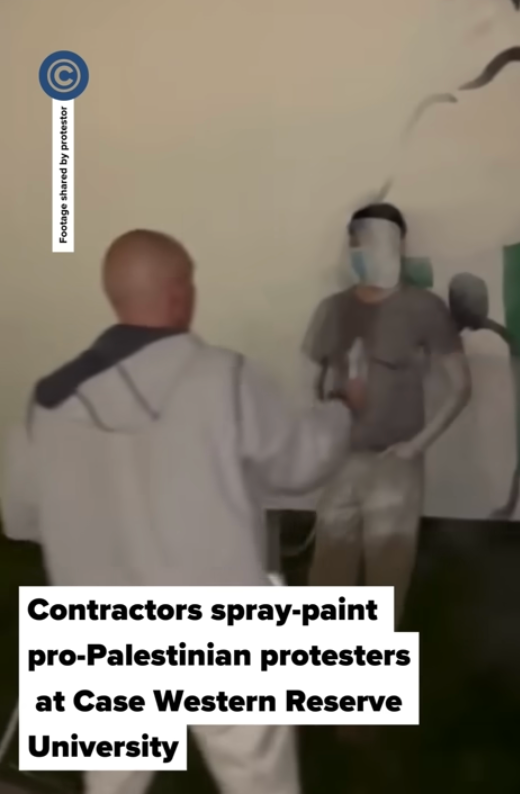Contractor sprays paint in faces of Gaza college protesters while covering up a pro-Palestine mural
The university’s president has since apologised for the incident
Your support helps us to tell the story
From reproductive rights to climate change to Big Tech, The Independent is on the ground when the story is developing. Whether it's investigating the financials of Elon Musk's pro-Trump PAC or producing our latest documentary, 'The A Word', which shines a light on the American women fighting for reproductive rights, we know how important it is to parse out the facts from the messaging.
At such a critical moment in US history, we need reporters on the ground. Your donation allows us to keep sending journalists to speak to both sides of the story.
The Independent is trusted by Americans across the entire political spectrum. And unlike many other quality news outlets, we choose not to lock Americans out of our reporting and analysis with paywalls. We believe quality journalism should be available to everyone, paid for by those who can afford it.
Your support makes all the difference.Anti-war protesters at an Ohio university were sprayed with paint this week, as they tried to stop a pro-Palestinian mural from being erased on campus.
A video shows people spraying pro-Palestinian protesters at Case Western Reserve University in Cleveland, Ohio on Tuesday evening. The protesters were blocking an anti-war mural painted on a campus wall.
Student protester Ameer Alkayali, 18, said he plans to take legal action against the university after being sprayed.

“I stood against the wall, and the painters asked ‘Should we continue?’ The cops showed general confusion and didn’t tell them to stop,” Mr Alkayali told local outlet cleveland.com. “So, as seen in the video, they continue to just paint right over us.”
“They told us to not put our hands in front of the machine because it’s dangerous,” he continued. “And we put our hands up, and they still continued to paint on our hands and sprayed us with it.”
The university president, Eric Kaler, later apologised for the incident.
“I have reviewed video footage, which depicts students blocking the wall as a third-party contractor spray-painted directly onto protesters as he attempted to finish painting the wall, and I am disturbed by what occurred,” Mr Kaler said.
“Let me be clear: no students – or any individuals – should ever be treated this way, especially on a campus where our core values centre on providing a safe, welcoming environment,” he continued. “This is not who we are as an institution, and I am deeply sorry this ever occurred.”
Subsequently, on Wednesday evening, 200 protesters marched to Adelbert Hall, an administrative building on campus, the university said in a statement. Ten protesters then barricaded themselves inside.
Mr Kaler said protesters who have broken campus rules may be subject to legal action.
“None of this behaviour is acceptable, nor does it contribute to the safe, welcoming and inclusive environment for which Case Western Reserve is known,” he said.
These developments come more than a week after protesters at Columbia University occupied the school’s Hamilton Hall. The demonstrators renamed it Hind’s Hall, in honour of a six-year-old Palestinian girl killed by Israeli tanks in Gaza. The New York Police Department stormed the building and arrested more than 100 protesters on 30 April.
Protesters have been staging demonstrations against Israel’s war in Gaza on Case Western Reserve University’s campus since 29 April, when they set up an encampment on campus.
Hours after they began building the encampment, police detained more than 20 protesters, local outlet Spectrum News reports. A school spokesperson told the outlet students were breaking campus rules by bringing tents onto the lawn area.
“In accordance with Case Western Reserve policies, protestors must follow specific restrictions regarding the time, place and manner of such activism, including ensuring their actions do not unreasonably interfere with university operations (this includes setting up encampments on campus property and the use of disruptive sound),” Mr Kaler said after the arrests.
The Independent has contacted Case Western Reserve University for comment.
Join our commenting forum
Join thought-provoking conversations, follow other Independent readers and see their replies
Comments